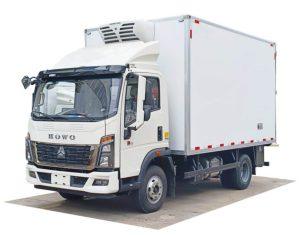Monday to Saturday - 8:00 -17:30
The Comprehensive Guide to Truck Milk Tanks
Introduction
Truck milk tanks play a crucial role in the dairy industry, serving as mobile storage solutions for transporting milk from farms to processing facilities. These specialized tanks are designed to keep milk fresh and safe during transit, maintaining its quality and compliance with health regulations. This article aims to provide an in-depth look at truck milk tanks, their types, functions, benefits, and maintenance tips.
Understanding Truck Milk Tanks
What Are Truck Milk Tanks?
Truck milk tanks are insulated containers mounted on trucks designed to transport bulk milk. They come in various sizes, typically ranging from 1,000 to 8,000 gallons, depending on the needs of dairy farms and processing plants.
How Do Truck Milk Tanks Work?
These tanks function by utilizing a combination of thermal insulation and refrigeration systems. The refrigeration system keeps the milk at temperatures below 40°F (4°C), preventing bacterial growth and spoilage during transport. The insulation helps maintain this cold temperature throughout the journey.
Types of Truck Milk Tanks
There are several types of truck milk tanks, each tailored for specific needs:
- Single Wall Tanks: These are the most basic type and are usually less expensive. They lack insulation and require extra care in temperature management.
- Insulated Tanks: Featuring thermal insulation, these tanks help maintain lower temperatures, ensuring milk quality during transportation.
- Refrigerated Tanks: Equipped with refrigeration units, these tanks provide optimal temperature control, preventing spoilage effectively.
- Vacuum Tanks: These tanks maintain a vacuum within, offering even better protection against contamination.
Key Features of Truck Milk Tanks
Construction Materials
Truck milk tanks are typically constructed from stainless steel or aluminum, which are hygienic and durable. Stainless steel is preferred for its corrosion resistance and ease of cleaning.
Insulation and Refrigeration
The insulation methods used in milk tanks vary. Most tanks utilize polyurethane foam, helping reduce energy consumption while maintaining the required cooling temperatures. Refrigeration systems commonly employ electric units to circulate coolant and ensure effective temperature control.
Tank Sizes and Capacity
Truck milk tanks come in various sizes, and choosing the right capacity is essential based on the volume of milk to be transported. The table below summarizes common sizes:
| Tank Size (Gallons) | Typical Use Case |
|---|---|
| 1,000 | Small farms |
| 3,000 | Medium farms |
| 5,000 | Large farms |
| 8,000 | Commercial operations |
The Importance of Cleaning and Maintenance
Cleaning Procedures
Proper cleaning of truck milk tanks is vital to prevent bacterial contamination. A regular cleaning protocol should include:
- Rinsing the tank with hot water to remove residue.
- Applying a high-quality dairy cleaning agent.
- Using mechanical scrubbers where applicable.
- Rinsing thoroughly with clean water.
Maintenance Tips
Regular maintenance extends the life of truck milk tanks. Here are some practical tips:
- Inspect insulation for any damage or wear.
- Check refrigeration units regularly for proper functioning.
- Maintain regular service checks with qualified technicians.
- Keep all parts clean and free from milk residue.
Benefits of Truck Milk Tanks
Quality Preservation
One of the primary benefits of using truck milk tanks is the preservation of milk quality. By keeping the temperature controlled, these tanks prevent spoilage and extend shelf-life.
Cost-Effective Transportation
Transporting milk in bulk using truck milk tanks is more cost-effective than smaller containers, reducing per-gallon transportation costs and increasing efficiency.
Compliance with Regulations
Truck milk tanks are designed to meet health and safety regulations set forth by various authorities, keeping the product safe for consumption and protecting the dairy industry’s integrity.
Choosing the Right Truck Milk Tank
Factors to Consider
When selecting a truck milk tank, various factors should be considered:
- Farm Size: Larger operations may require bigger tanks.
- Transportation Distance: Longer distances may necessitate higher insulation or refrigeration standards.
- Budget: Determine how much you’re willing to invest.
- Compliance Needs: Ensure the tank meets your local regulations.
Consulting with Experts
Consulting with professional suppliers and experts can provide valuable insights into which truck milk tank best fits your specific needs and operational parameters.
Innovations in Truck Milk Tanks
Technology Advancements
Recent advancements have led to the incorporation of smart technology into truck milk tanks. Features might include:
- Temperature Monitoring: Real-time temperature monitoring systems help ensure optimal conditions.
- GPS Tracking: GPS technology aids in tracking movement and optimizing routes.
- Telemetry Systems: These systems can alert transporters about any issues in real-time, ensuring prompt interventions.
Eco-Friendly Options
With increasing environmental awareness, some manufacturers are developing eco-friendly tanks that utilize sustainable materials and energy-efficient cooling systems, reducing the carbon footprint of milk transportation.
Cost Considerations
Initial Investment
The initial investment for a truck milk tank can vary widely based on size, material, and features. On average, prices can range from $20,000 to $100,000 or more, depending on specifications.
Operating Costs
Consider ongoing costs, such as maintenance, cleaning supplies, fuel for the truck, and insurance. Budgeting for these operational expenses will help ensure that dairy transportation remains economical.
FAQ Section
1. How often should truck milk tanks be cleaned?
Truck milk tanks should be cleaned after each use to prevent bacterial growth and maintain milk quality.
2. What is the ideal temperature for transporting milk?
The ideal temperature for transporting milk is below 40°F (4°C) to prevent spoilage and keep it fresh.
3. What materials are truck milk tanks made of?
Truck milk tanks are primarily made from stainless steel or aluminum, both of which are durable and hygienic.
4. How long can milk be stored in a truck milk tank?
Milk can generally be stored in a truck milk tank for up to 48 hours as long as the temperature is maintained below 40°F (4°C).
5. What are the benefits of using insulated truck milk tanks?
Insulated truck milk tanks help maintain a stable temperature, minimizing spoilage and ensuring milk quality during transport.
6. Are there any regulations for transporting milk in truck milk tanks?
Yes, there are strict regulations governing the transportation of milk, including temperature control and hygiene standards that must be followed to ensure product safety.









